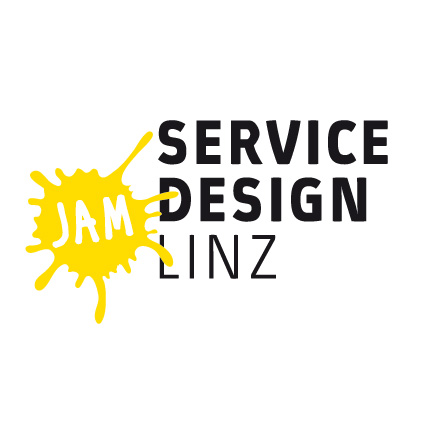A ServiceDesign Jam will be staged for the first time in Linz—or, more precisely, in Axis Linz – Coworking Loft in Tabakfabrik—March 7-9, 2014. This is an extraordinary group experience in which participants develop—jointly, over 48 hours—innovative ideas and prototypes for services. This is one of the Global Service Jams being held simultaneously in over 120 cities worldwide.
The local jam is being organized by Plattform ServiceDesign Linz, an open group of individuals with diverse occupational backgrounds. Two professionals are delivering the keynote speeches and running the supplementary workshops (Jam Satellites), as well as providing methodological guidance.
We recently interviewed the organizers and speakers on the subject of Service Design and the Jam format.
Questions to the Organizers Rainer Kargel, Iris Mayr, Patricia Stark, Sylvia Prunthaller
What motivated you to stage a ServiceDesign Jam?
Rainer Kargel: I participated in two jams in Vienna and was enthusiastic about the concept right from the start! It’s the jam’s open format that generates a type of creative energy that’s often hard to find in the so-called creative economy. Then, last autumn, we made the decision to stage our “own” jam and we successfully applied for permission to organize one.
Why in Linz?
Iris Mayr: We all come from different economic sectors: culture & project management, manufacturing, tourism, advertising. We work in Linz and, at the same time, place great value on internationality. The ServiceDesign Jam brings another event with an international format to Linz and, at the same time, focuses attention on the service design discipline.
Tell us about the sequence of events that make up a jam. And what are the highlights?
Patricia Stark: Right at the start of the event [Friday, March 7th, 4:30 PM)], we’ll finally reveal the—heretofore top-secret—meta-theme of this year’s jam. First, there’s a communal brainstorming phase. Then, we break up into small groups to generate concrete ideas leading to initial sketches. On Saturday, the entire session is dedicated to prototyping, whereby we employ a wide array of formats, such as paper, storyboards, graphic media and video. On Sunday, we wrap things up and publish the results on the global Jam website, and also stage presentations within the groups.
And one more thing: “the fun factor” has highest priority not only at the Jam Party we throw at the end; it tops our agenda—alongside “accomplishments”—throughout the jam, and despite the time constraints that necessarily come into play!
Questions to: Alexander Wiethoff, Interaction Designer
Alexander Wiethoff, a jam is a relatively open event as far as the group of participants, the sequence of stages, and the self-organization of the groups are concerned. What is the success factor of formats like this?
The clear advantage is in the high degree of “lateral permeability” and the speed with which new topics establish themselves, topics that would otherwise remain isolated in discrete, specialized fields. Above all, it’s the rapid, interactive exchange process—just like in efficient prototyping!
You’re in charge of one of the so-called Jam Satellites [workshops staged in conjunction with the ServiceDesign Jam] and will also serve as mentor providing guidance throughout the event. What will your methodological inputs be?
I’ll offer support in the form of practical methods and techniques that can be applied quickly in many different disciplines to deal with problems. In my keynote speech, I’ll focus on prototyping techniques—fast ways to take an idea to the next level of development and quickly breathe life into it?
What are the potential benefits and the challenges of designing prototypes?
The benefit is definitely getting a better perspective on one’s own concept and more confidence in one’s own design. But I consider the biggest benefits to be enhancing team communication and fostering collaboration. The challenge is for there to be somebody on the team who “fires up” the others for this topic and dares to blaze a trail into unknown territory. Another key determinant is selecting the right method at the right time.
Alexander Wiethoff
teaches and conducts research as an interaction designer at the Department of Computer Science at Ludwig-Maximilians-Universität München. His doctoral dissertation was on “Prototyping Tools for Interaction Design.” Before his appointment in Munich, he was on the staff of the Copenhagen Institute of Interaction Design, where he worked on graphical user interfaces, tangible user interfaces and rapid prototyping for such clients as Nokia, Intel and Novo Nordisk.
Registration to ServiceDesign Jam
Auf http://jam.servicedesign-linz.at/ gehts zur Anmeldung zum ServiceDesign Jam Linz.
